The LG G3 Review
by Joshua Ho & Anand Lal Shimpi on July 4, 2014 5:00 AM EST- Posted in
- Smartphones
- LG
- Mobile
- Laptops
- G3
Battery Life
While we’ve gotten a good handle on how battery life is on the Snapdragon 801 platform with 1080p displays, we haven’t quite seen the same when it comes to a 1440p display. I’m sure that most people already understand the importance of battery life, so I’ll simply reiterate that our testing conditions are standardized. Everything other than the task at hand is turned off to the best of our abilities, and the display is calibrated as close as possible to 200 nits. The device is then run on an endless loop until it shuts down, starting with a fully charged battery. First, we’ll start with the WiFi web test.
I have to stop proceeding with the analysis with a disclaimer though. With the LG G3, we’ve found evidence of dimming behavior with manual brightness. In the worldwide model that we received, the dimming happens soon after setting the brightness level. A dangerous practice for sure if you only measure display brightness once before conducting battery life tests. However, in the SKT and likely the other Korean units that reviewers received, this dimming process takes around an hour or longer (but with a far shallower drop in actual brightness). It's clear that TI's LM3697 is the chip that controls the backlight brightness, but it's unclear what is setting the brightness curve. LG states that this mechanism is part of their 3A system to reduce display power, and they state that the brightness dimming effect is done in an effort to save power by reducing brightness at a rate that would be unnoticed according to the Weber-Fechener law of perception. This does make sense, but LG should offer the option to disable this functionality one way or another.
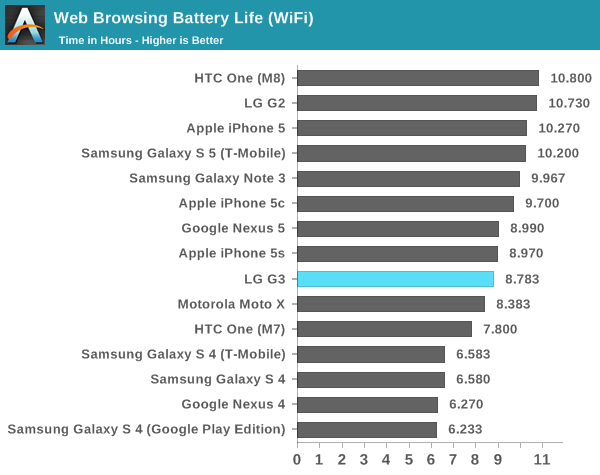
Here, the LG G3 has a major regression in battery life. While the LG G2 had around 11 hours of battery life on WiFi and was competitive with the Galaxy S5 and One (M8), the G3 is around the iPhone 5s in this test. There are a few reasons for this. If we compare battery capacity vs. display size, the LG begins at a disadvantage to HTC's One (M8). In order to equalize this gap, LG would need to fit the G3 with a 3150 mAh battery, something that would be difficult as a result of the loss in volumetric efficiency from the removable battery. The other reason is due to the lower panel efficiency, which is a direct result of the higher pixel density.
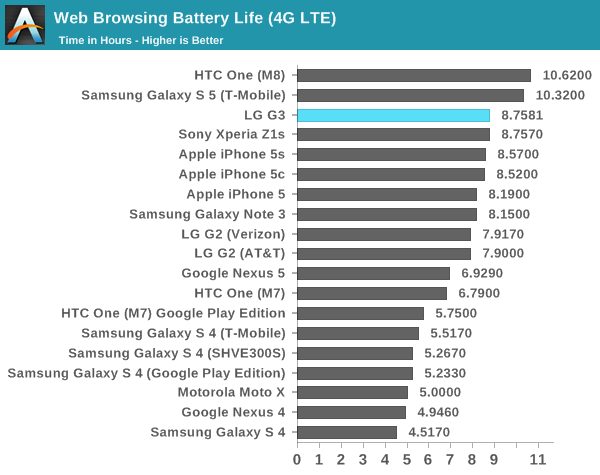
Surprisingly, in the LTE test we see a significant improvement over the LG G2, although it’s still behind the One (M8) and Galaxy S5 for the same reasons that I discussed in the WiFi test. These gains were likely made by improvements to RF and general process improvements such as envelope tracking and lower power process on the modem and other aspects of the SoC from S800 to S801.
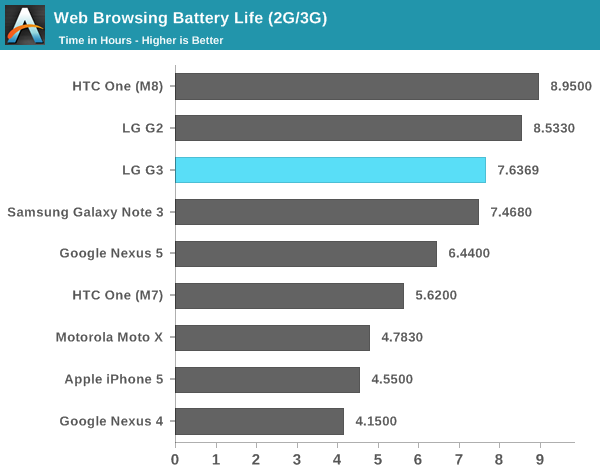
In WCDMA, there are very few surprises. As a result of bottlenecking on the network connection, battery life drops noticeably. The delta between the One (M8) and the G3 is relatively constant in this test as well, around 15-20% less in general.
Overall, the web test shows the power cost of the 1440p panel. However, in many situations the importance of display power efficiency can drop dramatically, especially if other components consume similar levels of power. To take a closer look at this, we turn to the compute-bound battery life tests. The first is GFXBench, which runs an endless loop of T-Rex on the display until the phone shuts down.
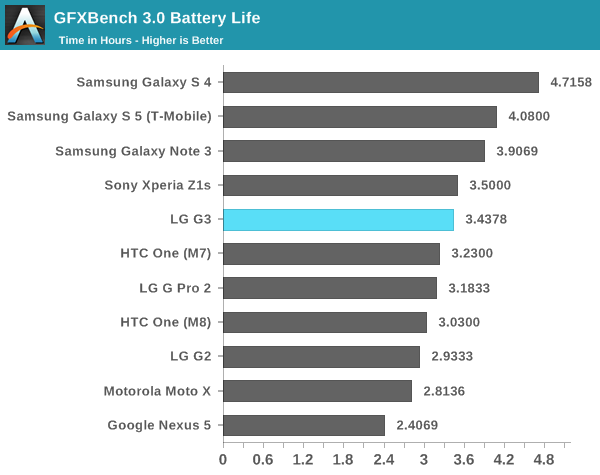
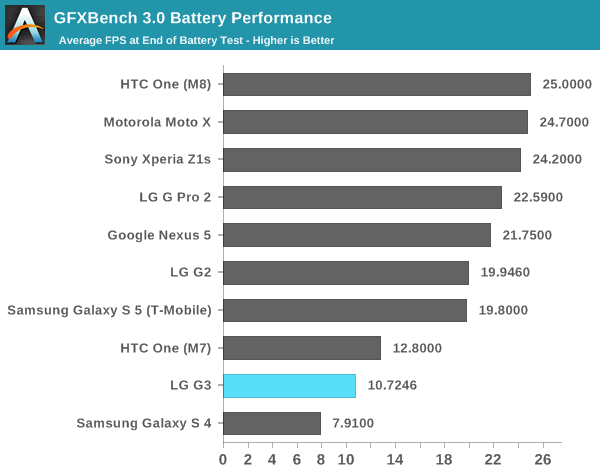
Here, we see that the LG G3 is between the One (M8) and Galaxy S5 in overall runtime. What’s surprising is that end of run FPS is below both the One (M8) and Galaxy S5, even when compensating for the difference in resolution by multiplying the score by 1.77. This actually places the LG G3 behind the G2.
However, looking at the overall picture, it’s very clear that LG is simply using a throttling mechanism that results in sinusoidal behavior. By averaging the last runs, the realistic end of run FPS is around 13.636. By scaling this to the 1080p-equivalent FPS, we see that the end of run FPS is actually around 24.1357. This means that there’s still a noticeable difference between the One (M8) and LG G3 in overall thermal dissipation capabilities, although not nearly as bad as the end of run FPS value might suggest.
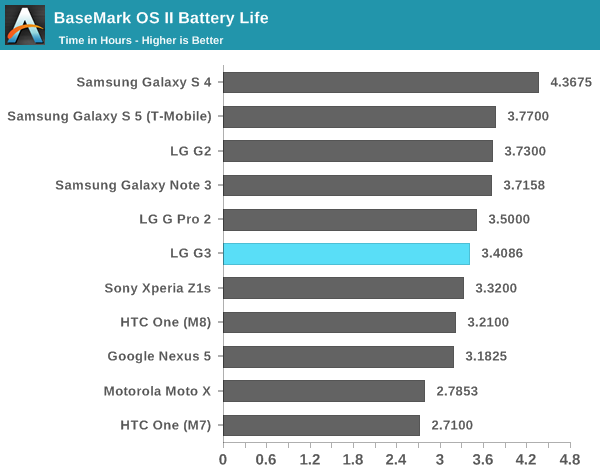
The next test is Basemark OS II, and we see that the battery life score sits between both the Galaxy S5 and One (M8), although it does worse than both of them in the battery score taking into account performance.
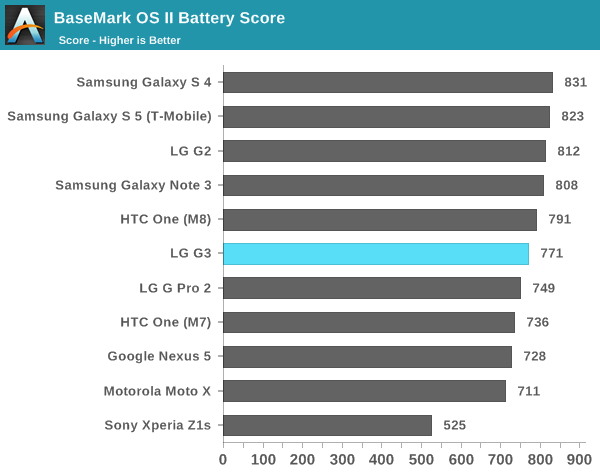
Overall, the LG G3 does acceptably well in battery life. However, after taking into account the dimming function it’s rather concerning how the G3 fails to keep up with the rest of the competition in this critical area. To really get a good idea what why this is though, we have to look at actual power numbers. This will allow us to truly quantify the power differences.
Charge Time
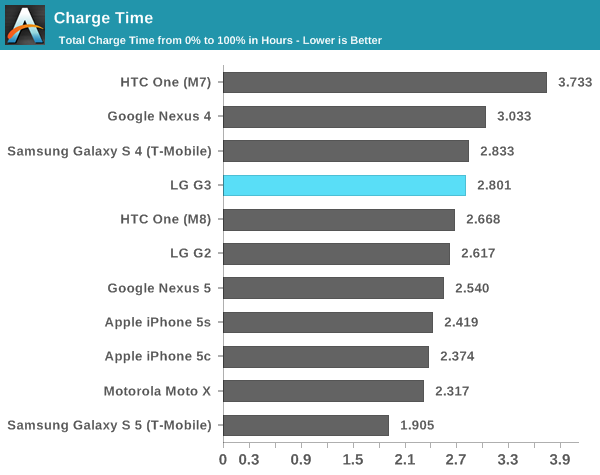
In this test, the LG G3 trails behind both the One (M8) and Galaxy S5 in charge time, although it's quite close to the One (M8). This is strange, especially because the LG G2 has the same battery size. However, this can be explained by the change to charging protocol, as it seems that the G3 doesn't support Qualcomm's Quick Charge technology. Instead, signalling is done over BC 1.2. As we'll see later in the article, this is due to the charger chip used.


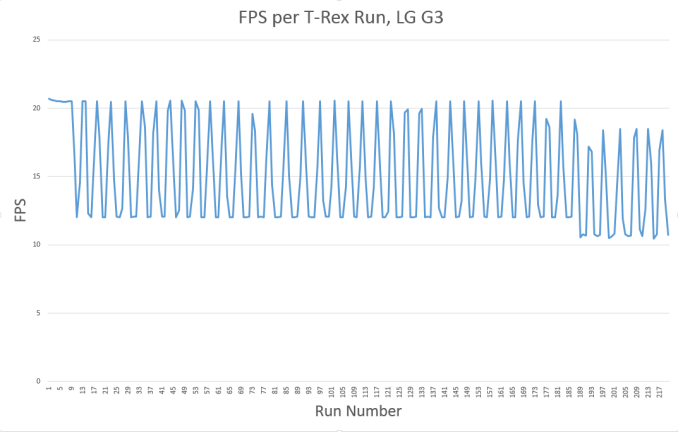








174 Comments
View All Comments
Mumrik - Sunday, July 6, 2014 - link
"even if it’s a bit off-putting that LG is trying to make plastic feel like metal. "I'm generally not a fan of that either, but surely it's better than Samsung working hard to make plastic feel even cheaper?
rlab_joo - Sunday, July 6, 2014 - link
I wouldn't worry about battery life too much. The devs, and rom creators, at xda developers, haven't got to it yet, you can do wonders there.CoryS - Monday, July 7, 2014 - link
No...people convince themselves they do wonders. In reality custom roms usually hurt battery life, and custom kernels have hosts of other issues.Sunsmasher - Monday, July 7, 2014 - link
This is by far the most thorough, insightful and intelligent review that I've seen on the LG G3.I own the G2, and this review gave me more valuable information than any other review that I've read (and I've read many, many of them). Kudos to Joshua and Anand!
rocktober13 - Monday, July 7, 2014 - link
Is it worth the extra $100 or $200 over the G2? I have an upgrade coming up on Verizon. I don't like the M8 with the wasted space from the HTC logo, and my wife has the GS5 so I can't get that ;).Also, I heard there is a 2GB and 3GB version; would there be any noticeable difference in performance?
yvn - Monday, July 7, 2014 - link
I was so gonna get this phone as I hoped the display would be the best in regards to color accuracy....i am very disappointed now :(djc208 - Tuesday, July 8, 2014 - link
My biggest problem with my original Optimus G has been LGs speed in updating the software. There are reports that we might get one last bump to 4.4 kitkat, otherwise they they haven't released an upgrade since they went to 4.2, which is sad considering it's essentially the same phone as the Nexus 5, so Google practically does all the work for them.Meanwhile the SGS4 is already running 4.4.
phoenix_rizzen - Friday, July 11, 2014 - link
Optimus G is the same phone as the Nexus 4, not the Nexus 5 which is based on the LG G2.The OG is very easy to root and install custom ROMs onto. There's a vibrant community of devs working on the OG on XDA. My OG died before I could test Android 4.4 on it, but it ran beautifully with RootBox (Android 4.2.2) and Carbon (Android 4.3.1). ParanoidAndroid, SlimBean/SlimKat, and a handful of others are also available.
I tried to like the LG version of Android, but just could not get over the colour scheme (too bright for me; physically painful to use in the dark, even at low brightness). The only part of the LG ROM I liked was the handwriting recognition in the keyboard. However, the gesture feature of the AOSP keyboard is much nicer to use. :)
PETER WONG - Tuesday, July 8, 2014 - link
Finally this morning Google help me to install Candy Crush in G3Shan83 - Wednesday, July 9, 2014 - link
Guys, people who are using this phone for quite some time, please do share your thoughts about "overheating" of G3 being mentioned by people.Is it abnormally getting heated even upon moderate usage / playing low graphic intense game or continuous Wi-Fi usage?
Please comment.